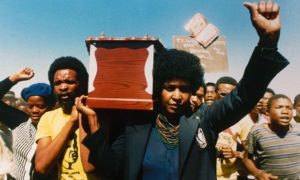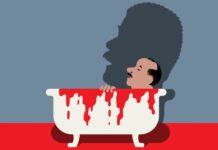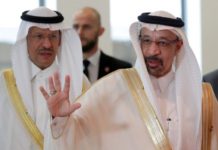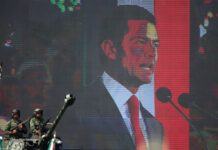Winnie Mandela was a hero. If she’d been white, there would be no debate
Peaceful protest did not end apartheid: it took revolutionaries. And it shouldn’t be difficult to choose between a system of racial supremacy and a person who helped overthrow it.

Winnie Madikizela-Mandela was the leader of a liberation struggle. She was a radical until the end.’ Photograph: AP
Heroes are curious things. Ours have roots in the ancient Graeco-Roman sense of the concept, which places a premium on military victory. What’s problematic is how many of our heroes embody an inherent level of violence, as is unsurprisingly the case with people whose main accomplishments arise from war. We are tolerant about people who regarded the working classes as an abomination (Wellington), the transatlantic slave trade as a good idea (Nelson) or Indians as repulsive (Churchill), because we think the ends – defeating Napoleon or Hitler – justified the means.
Winnie Madikizela-Mandela, as the press coverage of her death this week shows, is not entitled to the same rose-tinted eulogy as our white British men. She is “controversial” and a “bully”. One newspaper columnist was boldly willing to abandon his usual restraint in not writing ill of the dead specially for this “odious, toxic individual”.
The media reports have raised the horrific murder of 14-year-old Stompie Moeketsi, though few have been unduly troubled by the fact that this was a crime she always denied any involvement in, or by the ample evidence of the lengths to which the apartheid regime went to infiltrate and smear her and her followers.
South Africa’s ‘Mother of the Nation’, Winnie Madikizela-Mandela dies – video
Sadly, I suspect much of the newly discovered outrage sparked by Madikizela-Mandela’s death has little to do with any recent conversion to the cause of Black Lives Matter, or accompanying grief for the fate of little Stompie – one of so many black children who lost their lives during the brutality of apartheid and the struggle against it. What it’s really about is a reluctance to admit that apartheid was so wrong, and so entrenched; and that without the resilience and vision of Madikizela-Mandela, and those of her ilk, it would not have been brought down.
Britain’s heroes are allowed to have waged war. The warriors against white supremacist oppression, on the other hand, are not. When, for instance, I questioned Piers Morgan over the appropriateness of having a 50-metre column in Trafalgar Square to commemorate Admiral Nelson, he spat that Nelson Mandela has a statue despite being a “terrorist”. When I debated with a renowned naval historian over his adulation of the admiral, the argument wound its way to Haiti – the only example in history of slaves successfully overthrowing their masters and establishing their own republic – and whether this was a victory for the enslaved over their oppressors (my view) or a tragedy for the plantation owners who were killed in the process (his).
There is no end to the contortions in our psyche. Who now – outside South Africa, where I have heard its demise lamented more than once – would defend the apartheid regime? It’s easy to condemn in hindsight. Yet we have forgotten what it actually takes to overthrow such tyranny when the legal and moral force of a sovereign state was on the side of white supremacy. Columnists did not cut it. Activists could not have done it. Peaceful protest did not do it. Sports boycotts, books, badges and car boot sales did not do it. It took revolutionaries, pure and simple. People willing to break the law, to kill and be killed.
Our ambivalence about apartheid is the elephant in the room










